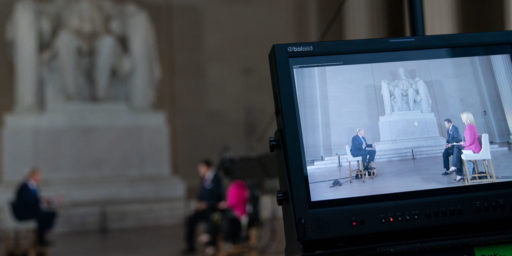Experts and Cable News
Why talk to boring experts when you can, instead, air some more bickering?
 Media Matters looks into cable new discussions of the debt ceiling debate and finds a dearth of economists: REPORT: Economists Shut Out Of Debt-Ceiling Debate
Media Matters looks into cable new discussions of the debt ceiling debate and finds a dearth of economists: REPORT: Economists Shut Out Of Debt-Ceiling Debate
A Media Matters analysis of evening cable news programs reveals that just 4.1 percent of guests who discussed the debt-ceiling debate were actual economists.
[…]
Of the 1,258 guest appearances during segments that discussed the issue in the month leading up to the debt deal, only 52 — or 4.1 percent — were made by economists.
[…]
The definition of “economist” used in this study is broad — it includes any guest with an advanced degree in economics or who has served as an economics professor at the college or university level. It also includes guests who have worked as government economists (such as Ben Stein, who formerly “worked as an economist at The Department of Commerce”).
Now, some will see “Media Matters” focus on that (and yes, they are trying to make a political point in their post). To me, however, those things are superfluous. The real issue is that I think this does underscore a major disservice done by cable news in general (or that it points out that cable news’ main job isn’t to inform, but rather is to entertain—because people prefer to hear politicos bicker than they do actual experts discuss a topic).
I have long noticed this behavior when it comes to election and other political coverage, because it is rare that one sees an actual political scientist being interviewed (save for Larry Sabato and handful of pollsters who have advanced degrees). A side criticism is that whenever news outlets have persons with academic backgrounds on to talk about politics they get historians, not political scientists. Sure, Doris Kearns Goodwin can dish anecdotes about Lincoln’s cabinet of JFK’s days at Camelot, but what does she really know about contemporary politics or the state of the current political science?
Of course, granted, people prefer to hear stories and quips rather than actual analysis.
Indeed, one of the reasons I rarely watch cable news any longer is that all it ends up being is point/counterpoint partisan bickering rather than actual information or analysis.
h/t: Balloon Juice.






To some extent, one has to wonder if economists, as in academic economists, are really “experts” either. Depending on what they’re talking about, they may be no more knowledgeable than anyone else who’s studied the matter. I’ve found, for example, that academic economists often don’t have a clear understanding of how business works at the practical level
The other thing you will notice about Cable News is that they run about 2-3 days behind the topics being discussed on the inter-tubes.
I think just about any thread on this site is more informative than anything you’ll see on most Cable News shows…but that’s probably just the nature of the beast. Maddow is trying to do long-form stuff but it’s hard given the format…which is why she is about the only one.
I’m thinking I’d like to see Micheal Reynolds and JTea square off on TV. hehehe.
Amein.
This is why I completely stopped watching these shows over a decade ago.
Right on regarding DK Goodwin. And even the real political scientists or economists they would have on (or for that matter, those quoted in newspapers) are too often chosen for their knack at a clever phrase rather than for their professional insights.
It always amazes me how much higher quality the major foreign public broadcasters like BBC and DW and IBA (Israel) are in this regard. “Public” is key here, and our PBS (which is enamored with the likes of Goodwin) hardly qualifies, especially after decades of right-wing attacks on its funding.
Simple. The problem is that Fox News created a standard of ratings that can only be reached by providing infotaiment, not news. You can´t have ratings of two, one million people by providing hard news on cable.
@Andre Kenji: The bickering format far antedates even the founding of FOX news as an entity. You can find it in the talking head news shows of the 60s and 70s. As news became infotainment, it was inevitable that the ‘tainment’ would overwhelm the ‘info’. Media exists by giving consumers what they want, not what might be best for them.
That FOX News outrates MSNBC only indicates that there are more people who want to be entertained with one kind of message than another.
@Andre Kenji:
John is right. In the cable world, CNN’s Crossfire perfected the “bickering” format long before FNC ever came along and there used to be a 60 Minutes segment called Point/Counterpoint that consisted of a liberal and conservative pundit disagreeing with each other for about five minutes a week.
“Jane, you ignorant…”, oh, never mind.
@Hey Norm:
Cage match?
Most of the successful business professionals I know don’t have a clear understanding of how business works at a practical level.
I think a sprinkle of experts, joining a mix of people on the ground and in the workforce, will give a broader and more accurate temperature reading of our economic reality. If only political scientists, economists are out in front then it is a theoretical perspective, governed by what should happen because of their given calculations of the market. Perhaps that’s why the news so often seems to be scratching it’s head when reporting how the numbers were “unexpectedly” lower than predicted, dealing with various consumer/price/manufacturing indexes, unemployment numbers, and the like — obviously lower than the “experts” projections.
However, panels of people composed of small business employers, big CEO’s, employees having stable work places, versus unemployed workers, bring together real, on-the-ground perspectives to the table, sometimes being far more accurate and helpful than relying on formulas and hypothetical’s derived from theoretical models alone.
For instance, when reading about the Solyndra employees speaking out about examples of the mismanagement and sloppy spending, one gets a better idea of the inept management problems, within the company itself, leading up to their bankruptsy.
Consequently, I think so-called “stories and quips” are relevant and worthwhile, as they speak of current issues, needs, and recommended solutions, if heeded might point the way towards a constructive means of solving them, rather than simply being guided by the theoretical input of experts.
@rodney dill: Definitely.
@John Burgess:
To be fair, FoxNews (smartly) accessed an undeserved market that had already been primed by local and emerging national conservative talk radio.
It’s also fair to take into account market penetration and access — note that MSNBC is not included in many coax(*) basic cable packages. So comparing their ratings isn’t exactly apples and oranges.
(*) – I’m not a cable subscriber but my understanding is digital cable basic packages often also include MSNBC (but up in the nosebleed number sections).
@jan:
To b fair, if we are addressing issues of (related) business, these people are experts. The only possible issue with this strategy is at what point are witnesses and experts getting confused.
Jan, its slightly ironic that the link you used to support your point reproduces the very problem Stephen discussed. Hot Air copies and pastes the Washington Post interviews with the on the ground parties (the workers) and then has an embedded talking heads video of Hannity and Malkin discussing the problem. Why not just link directly to the Washington Post article that actually had the “experts” talking in it?
Pretty simple really. It’s no longer about news, but rather about turning a profit. Got to have eyeballs on target for that, and ANYTHING that brings those eyeballs to bear goes. Result: Ferengi-Controlled Infotainment Networks, where the only sin is losing market share.
The point is not about bickering. Roger Ailes made Fox News a big success by showing a talk show after talk show(That required less costly things like international bureaus and correspondents) and diluting news content.
International news channels are better because they aren´t supposed to compete on Fox on ratings.